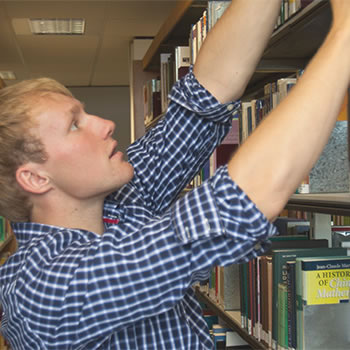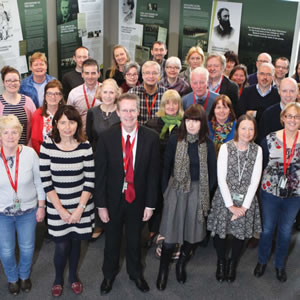- My Library Account
- Collections

Collections
The Library provides access to books, electronic resources, archives, special collections, and more to support your learning and research.
- Research

Research
The Library is committed to supporting your research needs with expert guidance and resources.
- Studying
- Academic Skills Service for Students
- Academic Writing Centre
- Assistive Technology Area
- Borrowing Limits, Lost Books & Fines
- Digital Literacy
- Equipment & More
- Group Study Rooms
- Library & IT Service Desk
- MakerSpace for Students
- Past Exam Papers
- Photocopying & Printing
- Shannon College Library
- Study Spaces
- Using Other Libraries

Studying
The Library has all the resources and supports you need to be successful in your studies at undergraduate and postgraduate level. Whether you're just starting your studies or working on your final project, we're here to help.
- Teaching

Teaching
We are here to help lecturers and academic staff deliver quality teaching and support their students' success.
- About

- Workshops & Events
Open Scholarship Forum
.jpg)
Enabling Research Data Management
Date: November 15, 2023, 12-13.30, Hardiman Building
We are excited to invite research students, academic and university support staff to our upcoming Open Scholarship Forum, "Enabling Research Data Management" This event will show different perspectives on how we can enable Research Data Management at the University of Galway, and will be followed by a complimentary light lunch.
Keynote: Science Foundation Ireland

Promoting Responsible Data Management: SFI’s Approach
Jenny Clarkin, Grants Compliance Manager, Science Foundation Ireland; Edie Davies, Programme Officer, Research Policy, Science Foundation Ireland
Jenny and Edie will speak about some of the measures SFI implements which aim to strengthen the quality of the outputs arising from SFI grants. The presentation will briefly outline SFI requirements related to Data Management Plans and Data Provenance Reviews which play a key role in supporting SFI’s commitment to fostering a culture of integrity and promoting good research practice.
Lightning Talks
- Dave Connolly, Cardiovascular Research Programme Manager, College of Medicine, Nursing & Health Sciences: From bytes to terabytes, the coal face experience of the evolving research data management challenge.
Dave will discuss the evolving rate of data creation and the challenge this presents for researchers and research data practitioners. With advances in automation and the constant push towards higher resolution how do we equip ourselves to maximise the potential of the data we are producing and facilitate beneficial impactful collaboration while also meeting the demands of data governance, accessibility and security.
- Sarah Dever, Data Protection Officer: Key Data Protection concepts in research projects.
A short presentation on the reasons why data protection impacts research and a brief overview of some key considerations such as Data Protection Impact Assessments, Privacy Notices, Data Protection Agreements.
- Leona Ryan, PhD candidate, Psychology and Health, School of Psychology: Ethical Considerations and Best Practices for Safeguarding Sensitive Qualitative Data: Balancing Research Integrity and Participant Privacy.
A sharing plan for sensitive qualitative data involves careful consideration of various factors. Firstly, it is crucial to assess the level of sensitivity of the data and determine whether it can be shared at all. If sharing is deemed appropriate, key considerations include the time duration for which the data should be retained, legal requirements and restrictions, and potential future uses for research purposes. It is important to establish clear guidelines for sharing, such as anonymisation techniques and data access controls to protect the privacy and confidentiality of participants. Additionally, obtaining informed consent from participants regarding data sharing is essential to maintain ethical standards. By addressing these considerations, researchers can safeguard sensitive qualitative data effectively.
The talks are followed by a panel discussion with attendees, moderated by Dr Cillian Joy, Head of Digital and Open Research, Library.
After the event attendees are invited to a light lunch in the foyer of the Hardiman Building.
Please use the "Register" button at the top of this page or go directly to the registration page at https://universityofgalway.libcal.com/calendar/workshopsevents/osf-data











